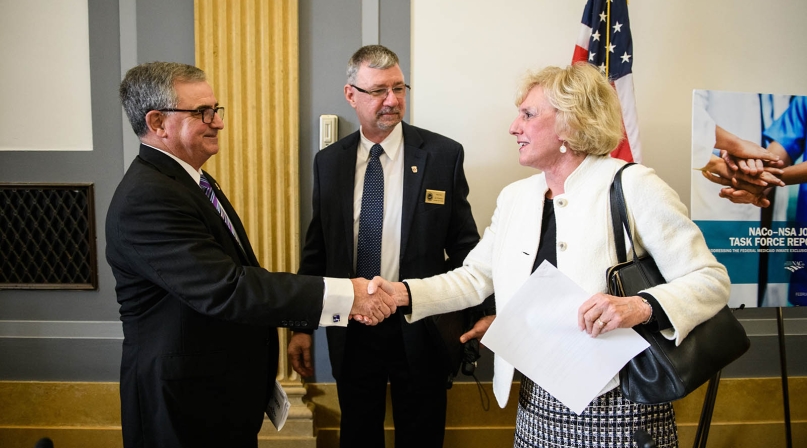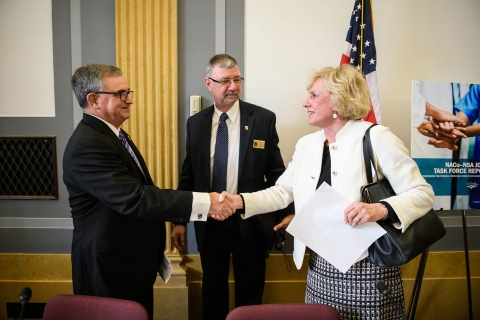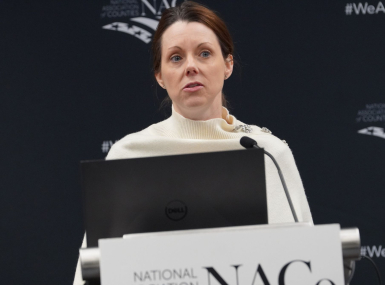Proposed policy change aims to fix loss of benefits for pre-trial detainees
Author
Upcoming Events
Related News

NACo and the National Sheriffs' Association (NSA) joint task force took their cause of jail health reform to Capitol Hill Tuesday, discussing a proposed policy change that would reinstate federal health care benefits for non-convicted justice-involved individuals during NACo’s 2020 Legislative Conference in Washington D.C.
“Those who are wealthy enough to pay bail keep their healthcare and those who are not wealthy enough to pay bail lose their healthcare,” Sen. Jeff Merkley (D-Ore.) said. “This really amounts to a penalty before adjudication.”
According to Merkley, 34 states have suspended, rather than cancelled outside health care for pre-trial detainees. “We need bipartisan work.”
In 2019, NACo and the NSA formed the joint task force to examine the impact of the Medicaid Inmate Exclusion Policy (MIEP), which removes health and veterans benefits from individuals who have been incarcerated, but not convicted.
The MIEP applies to individuals who are confined inside a jail. States are unable to bill Medicaid for any inmate care, unless the individual requires a hospital stay for at least 24 hours.
Senators Ed Markey (D-Mass.), Merkley, Sherrod Brown (D-Ohio) and Dick Durbin (D-Ill.) have introduced the Equity in Pretrial Medicaid Coverage Act. The legislation amends the Social Security Act to remove a limitation on an individual’s eligibility for medical assistance under the state Medicaid plan while the individual is in custody pending disposition of charges.
Merkley has also introduced the Restoring Health Benefits for Justice-Involved Individuals Act of 2019. The bill removes limitations on inmate eligibility for Medicare, the Children’s Health Insurance Program (CHIP) and veteran’s health benefits.
NACo released the NACo-NSA Joint Task Force Report, which includes a set of recommendations for policy holders, an overview of pre-trial detainees and jail healthcare and an outline of best practices.
Nancy Sharpe, Arapahoe County, Co., commissioner and co-chair of the task force, said the report calls for the need for federal policy to help restore federal health benefits.
“These are people who have not been convicted,” she said.
Sharpe said there are three main issues with the MIEP: Constitutionality to allow those who are awaiting trial and presumed innocent to have access to federal health benefits; the physical, mental and behavioral health of individuals and the costs to counties.
Greg Champagne, St. Charles Parish, La. sheriff and co-chair of the task force, said changing the MIEP Policy is a crime prevention measure.
“The overwhelming number of inmates are in for a short period of time,” he said. “Their plea agreement is to get in and out but even a short jail stay on a minimal charge where the benefits are cut off can have a big impact on your life and your healthcare.”
Champagne said 11 million people cycle in and out of county jails across the country.
“They’re falling through the cracks out there and ending back in our jails,” he said.
Currently, Merkley’s bill does not have any co-sponsors. Markey’s bill has four co-sponsors, but does not have bi-partisan support.

Attachments
Related News

National Association of Counties Launches Initiative to Strengthen County Human Services Systems
The National Association of Counties (NACo) announces the launch of the Transforming Human Services Initiative, a new effort to help counties modernize benefits administration, integrate service delivery systems and strengthen county capacity to fulfill our responsibility as America’s safety net for children and families.

Congress seeking ‘common-sense solutions’ to unmet mental health needs
Rep. Andrea Salinas (D-Ore.): “Right now, it is too difficult to access providers … and get mental health care in a facility that is the right size and also the appropriate acuity level to meet patients’ needs.”

Federal-level child welfare priorities center on supporting foster youth, families
Child welfare experts outlined current priorities at the federal level, including better supporting foster care youth who age out of the system and recruiting more foster parents, at NACo’s Human Services and Education Policy Steering Committee meeting.
